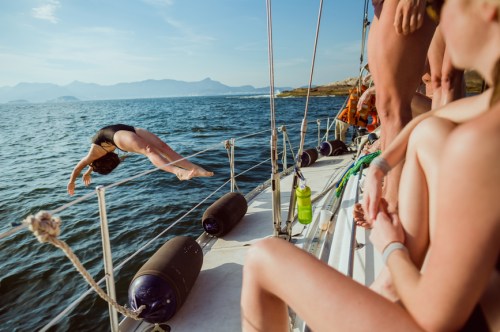Is it Okay To Spend Your Summer Peeing in Lakes and Oceans? We Asked an Expert
Sometimes when you're out swimming and you need to go, it might make sense to want to pee in a lake, but here's why you should reconsider.

If you grew up swimming in a lake, ocean, or other body of water—you might have peed in said water (or heard someone else talk about it, at least). As someone from Michigan, peeing in a lake (one of the many lakes in the state) is sometimes just what you do. However, doing so might put you at risk of pesky bacteria, according to Aleece Fosnight, MSPAS, PA-C, CSC-S, CSE, NCMP, medical advisor to Aeroflow Urology, physician’s assistant specializing in sexual health, women’s health, and urology. Not only that, but it is also not great for the water either.
Experts in This Article
urology and women’s health specialist at Aeroflow Urology
What happens when you pee in a lake
“When urinating, the urethra opens, and that water has direct access to your bladder,” says Fosnight. This is especially concerning for people with vulvas or people assigned female at birth, as they possess a shorter urethra making them more susceptible to bacteria getting into the bladder. When bacteria get into the urethra, you can develop a urinary tract infection (UTI) that requires antibiotic treatment. UTIs are common and treatable, but they aren’t pleasant; you can get a UTI from activities that introduce bacteria into the urethra, like masturbating or even holding in your pee habitually. Symptoms include burning in the urethra, soreness, urgency to pee, and burning when you pee.
The thing is—it’s possible that you pee in a lake, river, pond, or ocean and nothing happens. It’s not necessarily a guarantee that you’ll get an infection, but it does carry risks. Peeing submerged, according to Fosnight, is also less-than-ideal for your bladder because you want the least resistance possible when you pee (meaning only air surrounding you—not water), and the pressure of being in water can make it so that your flow is fighting gravity and you might not empty your bladder (which is known as dysfunctional voiding).
How does peeing in a lake affect the environment
This situation is essentially the opposite of a symbiotic relationship: It doesn’t benefit you or the place you decide to empty your bladder. On the environmental side of things, Fosnight shares that many organizations and experts stress that urine is not good for bodies of water, specifically fresh water. Human urine contains something called nitrates, which can cause increased algae in the water, making it toxic to the fish and other wildlife.
“Urine, although sterile, is considered a biohazard and should be discarded appropriately. Water treatment plants help us to have safe, clean drinking water. It may seem innocent but it can cause environmental hazards,” says Fosnight. Additionally, because many of us excrete medications in our urine, those byproducts get dumped into the water, making it an unsafe environment for people, fish, frogs, and other wildlife. Although one person using a lake to pee will not kill all of the fish, it’s good to know about how your behavior impacts the environment.
Sometimes, though, you may not have a choice between a bathroom or a lake. When you have to go, you have to go, so Fosnight recommends that the safest way to pee outdoors is by going in a sealable container and disposing of that in the trash. If you don’t have a receptacle or access to trash, Fosnight recommends you find a place around 200 yards from water sources that are free of foliage like poison ivy. Squat as low as you can without touching the ground, and dab with tissue or toilet paper (which you should discard of properly). It is the best way to do your business in the wilderness.










